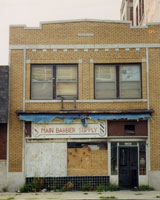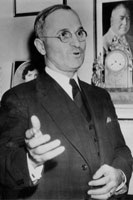Tom Pendergast's office, identified on exterior window signs as the "Jackson Democratic Club," was on the second floor of this very unpretentious two-story building from 1927 until his conviction for income tax evasion in 1939. The downstairs storefront was occupied by the Southwestern Linen Company, which, as a contemporary photograph shows, sold "Dundee-Towels-Institutional Linens." Upstairs, though, serious political business was carried on. Truman's friend and Kansas City businessman Tom L. Evans met with Pendergast in his second-story office on several occasions. "...You went up a flight of steps, turned to your left and then a couple of steps and there was a waiting room and then into another office where Mr. T. J. Pendergast's secretary had his office. He was a great, big man--Captain Mathews--about six foot six, weighted about 250 pounds. And then to the right, off of that, through a door, was Mr. T. J. Pendergast's office. There was always a number of people there to see Mr. Pendergast, beginning at 5:30 or 6:00 o'clock in the morning. He never saw anyone after noon, but he would be there real early in the morning. There was always a lot of people to see him...." (Tom L. Evans oral history interview, Truman Library, 1962-63.)
Evans was in the waiting room one morning, probably in 1928, when he heard Truman and several others--angry local road contractors as it turned out--talking with Pendergast. The contractors were angry that Truman was not giving them a large enough share of county road contracts. Evans heard Truman say, "Mr. Pendergast, they'll get their share...of the business, if they can deliver the right kind of materials, but they can't deliver cheap materials and charge regular price; I won't stand for it." Pendergast looked at the contractors and said, "I told you he was the hard-headest, orneriest man in the world; there isn't anything I can do. That's it gentlemen. You get your price right and get the best material. You heard him say it; you'll get the business." (Tom L. Evans oral history interview, Truman Library, 1962-63.) Truman remembered of this meeting that after the contractors had gone Pendergast said to him, "You carry out your commitments to the voters," which was advice that caused him no discomfort. (Handwritten manuscript, January 10, 1952, President's Secretary's Files.)
Truman was inclined to view Pendergast from a very personal perspective that dwelled on the support Pendergast typically gave him and on some of Pendergast's personal qualities that he admired. "T. J. Pendergast never talked to me about my duties as county judge," Truman remembered long after he had finished his service in county government, "except in matters of patronage-but the one time on the bond issue contracts and then he supported me." During the time Truman was U. S. Senator, Pendergast only contacted him once-to ask him to support Alben Barkley for Democratic floor leader. Truman explained that he was committed to someone else and would stand by his commitment. Pendergast did not press the issue. "On no other occasion did T. J. Pendergast ever talk to me about my actions in the Senate," Truman said. "He was an able, clear thinker and understood political situations and how to handle them better than any man I have ever known. His word was better than the contracts of most men and he never forgot his verbal commitments.... I never deserted him when he needed friends." (Undated handwritten manuscript, President's Secretary's Files.)
Truman (pictured right in his senatorial office with a photograph of Pendergast on the wall) recorded a somewhat different and more problematic assessment of Pendergast while he was still in the midst of county politics: "I am obligated to the Big Boss, a man of his word; but he gives it very seldom and usually on a sure thing. But he's not a trimmer. He in times past owned a bawdy house, a saloon and gambling establishment, was raised in that environment, but he's all man. I wonder who is worth more in the sight of the Lord?" (Undated handwritten manuscript, ca. 1931, President's Secretary's Files.)
Pendergast (pictured left in his prison admission photo) became ill in the summer of 1936 and his organization went into decline. His addiction to gambling on horse races drove him deep into corruption. He was indicted for income tax evasion in April 1939, plead guilty the following month, and was sentenced to prison. He died on January 26, 1945. Truman, Vice President of the United States for a little more than a week, caused considerable controversy by attending Pendergast's funeral. "He was always my friend and I have always been his," Truman said in an issued statement. "[Pendergast] had a political organization that was, I think, the best in the country," Truman said in early 1952. "…Had he died before he went astray, he would have been remembered as the greatest political boss of his age." (Interview with William Hillman and David Noyes, January 10, 1952. President's Secretary's Files.)
The Jackson Democratic Club was located at 1908 Main Street. The building still exists.


